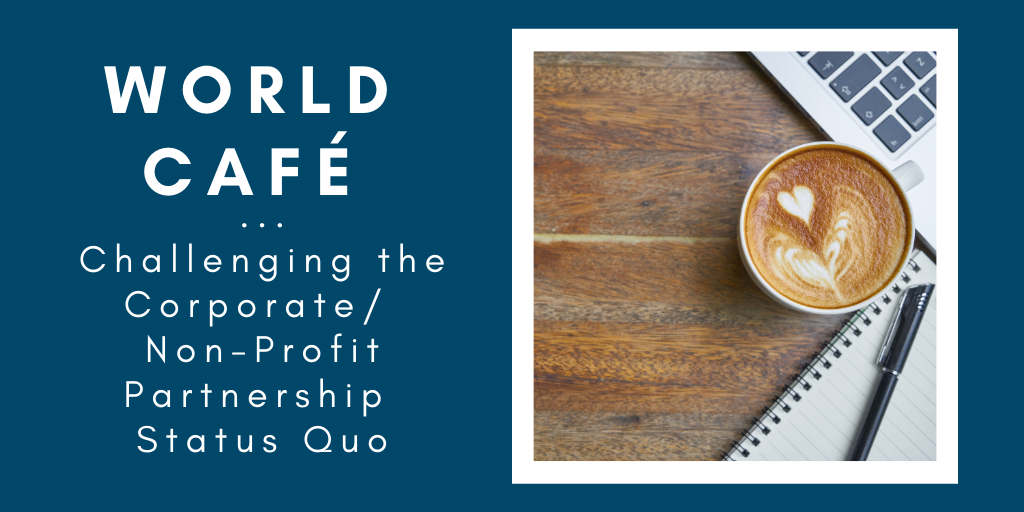
How can companies be better partners to non-profits? This is one of the themes regularly discussed by the companies of Volunteer Canada’s Corporate Community Engagement Council (CCEC). Building on Spring discussions, including the June Gathering with non-profits, CCEC reps participated in a World Café-style workshop to dig deeper on three areas of identified tension in some corporate/non-profit relationships:
- Creating better funding application processes
- Including or excluding non-profits which are not charities
- Paying community organizations for volunteering opportunities and speaking engagements
These discussion tables were facilitated by Ryan Adams (RBC), Elizabeth Dove (Volunteer Canada), and Gina Jordan (Enbridge) with support from Benjamin Miller (Ontario Nonprofit Network) and Cody de Leijer (Enactus Canada). Outcomes from the tables were taken back to participating companies by their representatives to inform planning, processes, and policies.
1. Creating better funding application processes requires a balance between asking necessary questions while minimizing barriers and cumbersome processes for the non-for-profits involved. The process is inherently inequitable and system change is required to address its limitations. A few suggested solutions to these identified tensions were to:
- Create different types of applications and allow for unrestricted funding
Having more simplified processes for returning applicants allows for less burden on the non-profit partner and less duplication in work. Additionally, offering grants with unrestricted funding gives grantees the flexibility to assess and determine where the dollars are most needed, creating autonomy and financial sustainability. - Simplify the process
Lessen the burden on the non-profit by providing detailed specifics around what funders are looking for and clear deliverables for reporting. Streamlining the process will free up staff time and pave the way for deeper relationships and mutual accountability. Also, make all of the questions visible to applicants prior to their start of an application form (e.g. a downloadable PDF with the questions) - Ensure Fairness
Be aware of the inherent power dynamics at play and re-assess the questions that are required in the application. Are they all necessary? Is it equitable and accessible to all non- profits in need of funding?
2. While not all non-profits are charities, all charities are non-profits, and both are important for building better communities. Often company policies have been set to only to support organizations that have charitable status, leaving many non-profits out of the equation for funding and volunteer support. These grassroots organizations often play a pivotal role in society, building and strengthening marginalized communities, enabling civic engagement, and advocating and supporting the most pressing social issues facing our communities. They also have governance Boards and other accountabilities. A Canadian “charity” is a tax-status, given by the Canada Revenue Agency (CRA), within the larger group of “non-profits”. A few suggested solutions to the identified tensions were to:
- Know the Distinction
Registered charity’s make up approximately only 10-20% of non-profit organizations; CRA oversight and tax receipts are the primary distinction. Non-profits often don’t seek registered status because it requires exclusive focus on charitable activities and can take significant time and effort. Both non-profits who are charities and those which aren’t play a significant role in building strong communities by providing critical services and supports that contribute to economic and social stability and having status does not mean one is more effective than the other. - Remove Barriers
Many corporate giving tech platforms are designed to work with registered charities by plugging into the CRA’s list of charities. Loosening these parameters, whether in the granting process, volunteering, or for general giving, will allow for more equitable dispersion of resources, ensuring organizations do not get left behind due to their lack of registered status. Some companies overcome limitations of their tech platforms by allowing other non-profits or community organizations and, as in pre-tech platform days, researching their performance.
3. Paying community organizations for volunteering opportunities and speaking engagements is an important aspect of respectful community engagement and needs to become the norm. The consensus was an approach to engagement that is mutually beneficial and provides reimbursement to the non-profit partners for their staff time and resources. A few suggested solutions to the identified tensions were to:
- Build cost into project planning
Make this a part of company guidelines, and explicitly part of the arrangements prior to the agreement. Budget for it and educate other employees about the importance of reimbursement for non-profit partners.
- Be aware of power dynamics
As many community organizations consider the engagement an opportunity to deepen their stakeholder connection, they may not be comfortable asking for reimbursement, for fear it will jeopardize the relationship. Proactively offer the reimbursement as part of the agreement and encourage the principle of reciprocity and related policies company-wide as many departments and individual employees make arrangements with non-profits.
- Know the difference
It is not a donation or financial gift. Rather it is a reimbursement for their human resources, supplies and other expenses to involve your stakeholders and this language should be used in the arrangement.
The conversations at the World Café just scratched the surface of a wider shift in responsible and equitable corporate community engagement. Together Volunteer Canada, and the Corporate Community Engagement Council (CCEC) are committed to collaborative conversations and consequent actions that challenge the status quo and remove barriers to strengthen participation in community for all.
Interested in joining the discussion? E-mail [email protected] to find out how.
